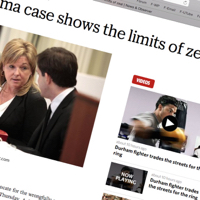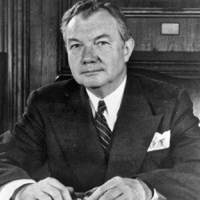Rascals case in brief
In the beginning, in 1989, more than 90 children at the Little Rascals Day Care Center in Edenton, North Carolina, accused a total of 20 adults with 429 instances of sexual abuse over a three-year period. It may have all begun with one parent’s complaint about punishment given her child.
Among the alleged perpetrators: the sheriff and mayor. But prosecutors would charge only Robin Byrum, Darlene Harris, Elizabeth “Betsy” Kelly, Robert “Bob” Kelly, Willard Scott Privott, Shelley Stone and Dawn Wilson – the Edenton 7.
Along with sodomy and beatings, allegations included a baby killed with a handgun, a child being hung upside down from a tree and being set on fire and countless other fantastic incidents involving spaceships, hot air balloons, pirate ships and trained sharks.
By the time prosecutors dropped the last charges in 1997, Little Rascals had become North Carolina’s longest and most costly criminal trial. Prosecutors kept defendants jailed in hopes at least one would turn against their supposed co-conspirators. Remarkably, none did. Another shameful record: Five defendants had to wait longer to face their accusers in court than anyone else in North Carolina history.
Between 1991 and 1997, Ofra Bikel produced three extraordinary episodes on the Little Rascals case for the PBS series “Frontline.” Although “Innocence Lost” did not deter prosecutors, it exposed their tactics and fostered nationwide skepticism and dismay.
With each passing year, the absurdity of the Little Rascals charges has become more obvious. But no admission of error has ever come from prosecutors, police, interviewers or parents. This site is devoted to the issues raised by this case.
On Facebook
Click for earlier Facebook posts archived on this site
Click to go to
Today’s random selection from the Little Rascals Day Care archives….
Click for earlier Facebook posts archived on this site
Click to go to
Today’s random selection from the Little Rascals Day Care archives….
Separate disciplinary panel needed for prosecutorial excesses

newsobserver.com
Online version of editorial.
Jan. 20, 2016
“The Jan. 15 editorial ‘The limits of zeal’ contrasted the penalty given Christine Mumma with the absence of rebuke to prosecutors for the ‘massive failure’ that kept her client wrongfully imprisoned for more than 36 years.
“It is not enough simply to point out this shameful disparity. The public embarrassment resulting from the hearing should move the North Carolina State Bar to empower a separate disciplinary panel to deal only with prosecutorial excesses. Such a panel would not lack for business.”
– From “A Panel for Prosecutors,” my letter to the editor of the News & Observer (Jan. 19) (text cache)
![]()
‘Tremendous … discretion’ has changed little since 1940

wikipedia.com
Robert H. Jackson
July 19, 2016
“The prosecutor has more control over life, liberty, and reputation than any other person in America. His discretion is tremendous. He can have citizens investigated and, if he is that kind of person, he can have this done to the tune of public statements and veiled or unveiled intimations.
“Or the prosecutor may choose a more subtle course and simply have a citizen’s friends interviewed. The prosecutor can order arrests, present cases to the grand jury in secret session, and on the basis of his one-sided presentation of the facts, can cause the citizen to be indicted and held for trial. He may dismiss the case before trial, in which case the defense never has a chance to be heard.
“Or he may go on with a public trial. If he obtains a conviction, the prosecutor can still make recommendations as to sentence, as to whether the prisoner should get probation or a suspended sentence, and after he is put away, as to whether he is a fit subject for parole.
“While the prosecutor at his best is one of the most beneficent forces in our society, when he acts from malice or other base motives, he is one of the worst….”
– From an address by Attorney General Robert H. Jackson to the Conference of United States Attorneys, Washington, D.C., April 1, 1940
Although Jackson’s cautionary words were directed toward federal prosecutors, they could hardly be more applicable to the State of North Carolina’s prosecution of the Edenton Seven. H.P. Williams Jr., Bill Hart and Nancy Lamb surely missed no chance to put forth “veiled or unveiled intimations,” to make a “one-sided presentation” or to otherwise act “from malice or other base motives.”
![]()
McMartin: Patient Zero in day-care abuse contagion?
 March 26, 2012
March 26, 2012
How did the moral panic over day-care ritual abuse spread so widely? Did some undetected psychotropic waft from Manhattan Beach to Edenton to Christchurch, New Zealand?
I was reminded of that lingering question while reading the smart and lively “Mistakes Were Made (But Not by Me): Why We Justify Foolish Beliefs, Bad Decisions and Hurtful Acts” (2007).
Although Carol Tavris and Elliot Aronson address the day-care panic only briefly, their reference to the McMartin case having produced “copycat accusations against day care teachers across the country” caught my attention. Yes, the timing, pattern and similarity of these cases suggest conscious imitation, but I haven’t seen the evidence.
“We didn’t mean ‘copycat’ literally,” Tavris explains in an e-mail. “It’s just that the McMartin hysteria scared people, and got them worried about their own local day care centers, and motivated DAs and cops to advance their careers by finding these villains… and thereby launched a thousand other efforts to find molesters under the bed and in the day care classrooms…. That’s what a hysterical epidemic means.”
Coincidentally, I’ve been corresponding with Michael Hill, professor of sociology at Victoria University of Wellington, who has traced outbreaks in New Zealand and Australia directly to visits from such American Appleseeds as Roland Summit and Kee MacFarlane.
‘They constantly asked him the same thing over and over again….’

Mills
Jan. 12, 2018
“[Bob Kelly’s] defense contended that the children’s allegations were just the responses of suggestible youngsters eager to please the interrogators who were urging them to disclose abuse. [Interviewed in “Innocence Lost: The Verdict”,] one mother whose child did not disclose abuse is seen heaping scorn on the police and social services interrogation of her child:
” ‘They constantly asked him the same thing over and over again, and they would rephrase it…. They talked to him, it had to be an hour and a half or so before we interrupted and they wanted to continue talking to him. I would guess the same questions were asked five or six times.’
“This mother’s recollection is one of the few clues to the police methods in this case. Police and prosecutors declined to cooperate with ‘Frontline.’ All of the investigative notes and tapes were destroyed, and the only source material available at trial was after-the-fact summaries….”
– From “Justice Abuse? ‘Frontline’ Documentary Takes Hard Look At A Small-town Scandal” by Bart Mills in the Chicago Tribune (July 20, 1993)
![]()











0 CommentsComment on Facebook